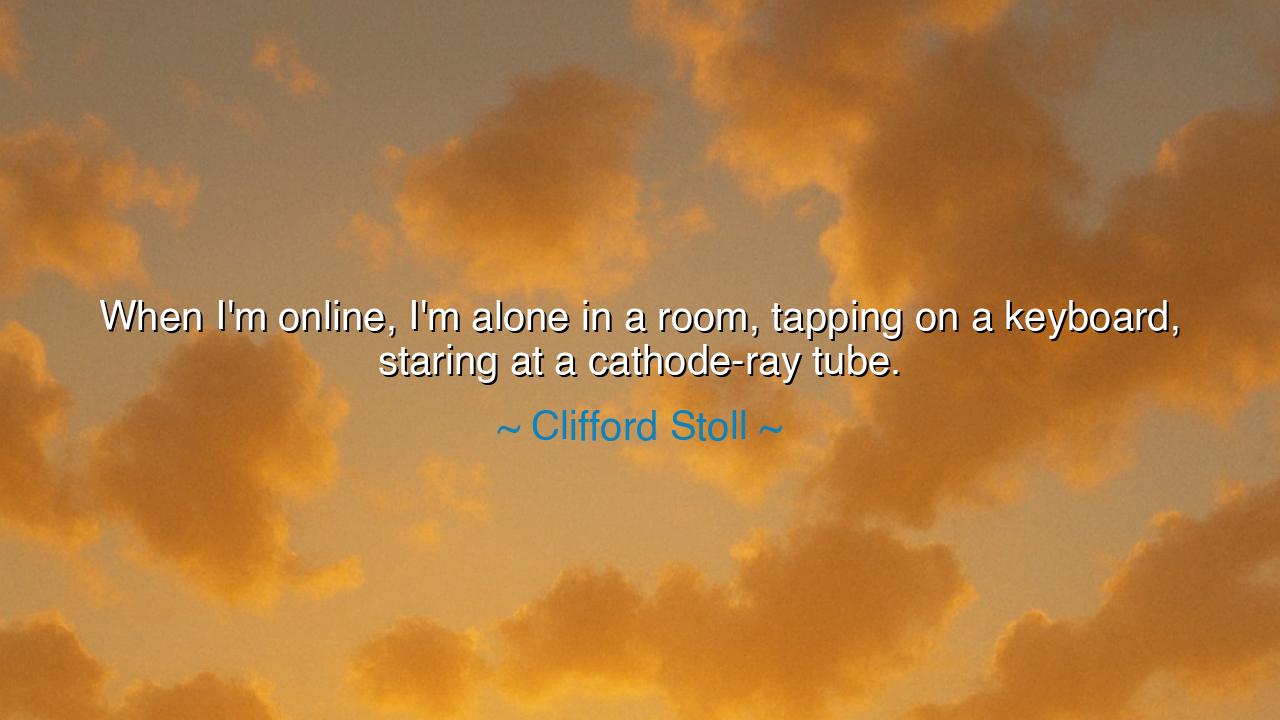
When I'm online, I'm alone in a room, tapping on a keyboard
When I'm online, I'm alone in a room, tapping on a keyboard, staring at a cathode-ray tube.






The words of Clifford Stoll — “When I’m online, I’m alone in a room, tapping on a keyboard, staring at a cathode-ray tube.” — echo like a prophecy from the early dawn of the digital age. They were spoken in a time before the modern world was drowned in glowing screens, when the Internet was still a quiet frontier of curiosity and connection. Yet even then, Stoll — an astronomer, writer, and one of the earliest voices to warn of technology’s double-edged nature — saw clearly the paradox that would come to define our era: that the more connected we seem, the more alone we often become. His words remind us that behind every message, every image, every flickering screen, there is still a solitary soul — a human being, alone in a room.
At the surface, the quote is simple, almost literal: a man sits before a cathode-ray tube, the old glowing heart of a computer monitor, fingers dancing across keys. But within this quiet image lies an entire philosophy — the realization that virtual presence is not the same as human presence. The warmth of a voice, the glance of an eye, the comfort of a shared silence — these things vanish when replaced by the hum of electricity. The illusion of community glimmers on the screen, yet around the user spreads the silence of isolation. Stoll, with his keen insight, spoke not only of his own experience, but of the loneliness that would soon become the hidden epidemic of the digital world.
The origin of these words lies in the late twentieth century, when Stoll, a scientist and systems administrator, wrote of his experiences tracking a hacker through the early Internet. He was among the first to glimpse both the wonder and the danger of a new age — the age of information. While others celebrated the birth of a global network, Stoll saw the shadow it cast: that in this new realm, people might mistake the simulation of connection for the real thing. To him, the image of being “alone in a room, tapping on a keyboard” was not just a description of his work, but a symbol of a larger truth — that progress, when not balanced by humanity, can lead us away from one another.
This truth has only deepened with time. Today, billions of souls dwell in the digital realm, reaching for one another through glowing screens. We send messages, we share faces, we call it connection — and yet, how often do we feel the ache of solitude beneath it all? We scroll endlessly, surrounded by the noise of countless voices, but untouched by the warmth of a single human hand. We have built temples of communication, yet many who dwell within them feel unseen. Stoll’s warning now sounds like a hymn for the modern age: technology can bridge distance, but not emptiness.
There is an ancient echo in his words — for every great innovation in history has carried both blessing and peril. When Prometheus stole fire from the gods, he gave mankind light, but also the power to destroy. When the printing press spread knowledge, it also spread deceit. And so it is with the Internet: a gift of endless reach, but also a mirror of our isolation. The ancients sought wisdom in temples and conversation; we seek it now in screens and feeds. Yet the heart, as it has always done, hungers for something more — not pixels, but presence; not text, but touch.
Let us then see Stoll’s words not as condemnation, but as counsel. He reminds us that to be online is not to be among others — it is to be in solitude’s disguise. This solitude need not be sorrowful, if we understand it rightly. There is wisdom in stepping back, in remembering that the screen is a tool, not a home. Use it to connect, but not to dwell. Speak through it, but also step beyond it. For the truest connections are not written in data, but inscribed upon the heart through shared moments, laughter, and tears.
The lesson, therefore, is this: guard your humanity in the age of machines. Let not your soul become a shadow behind a glowing wall. When you speak to others online, remember that they too are alone in their rooms, tapping at their keyboards, seeking warmth through the cold light of a screen. Reach them not merely with words, but with sincerity. And when the noise of the digital world grows loud, step away — walk among the living, touch the earth, hear the wind, and remember that life’s deepest truths are found not in circuits, but in connection face to face.
So, O seeker of wisdom, heed Stoll’s quiet prophecy. Do not forget yourself in the web of wires. Use your tools, but do not let them use you. For the screen may show the world, but it cannot hold your hand. And in the stillness beyond the glow, you will find what no machine can give — the sacred silence of your own soul, and the living warmth of another’s heart beside you.






AAdministratorAdministrator
Welcome, honored guests. Please leave a comment, we will respond soon